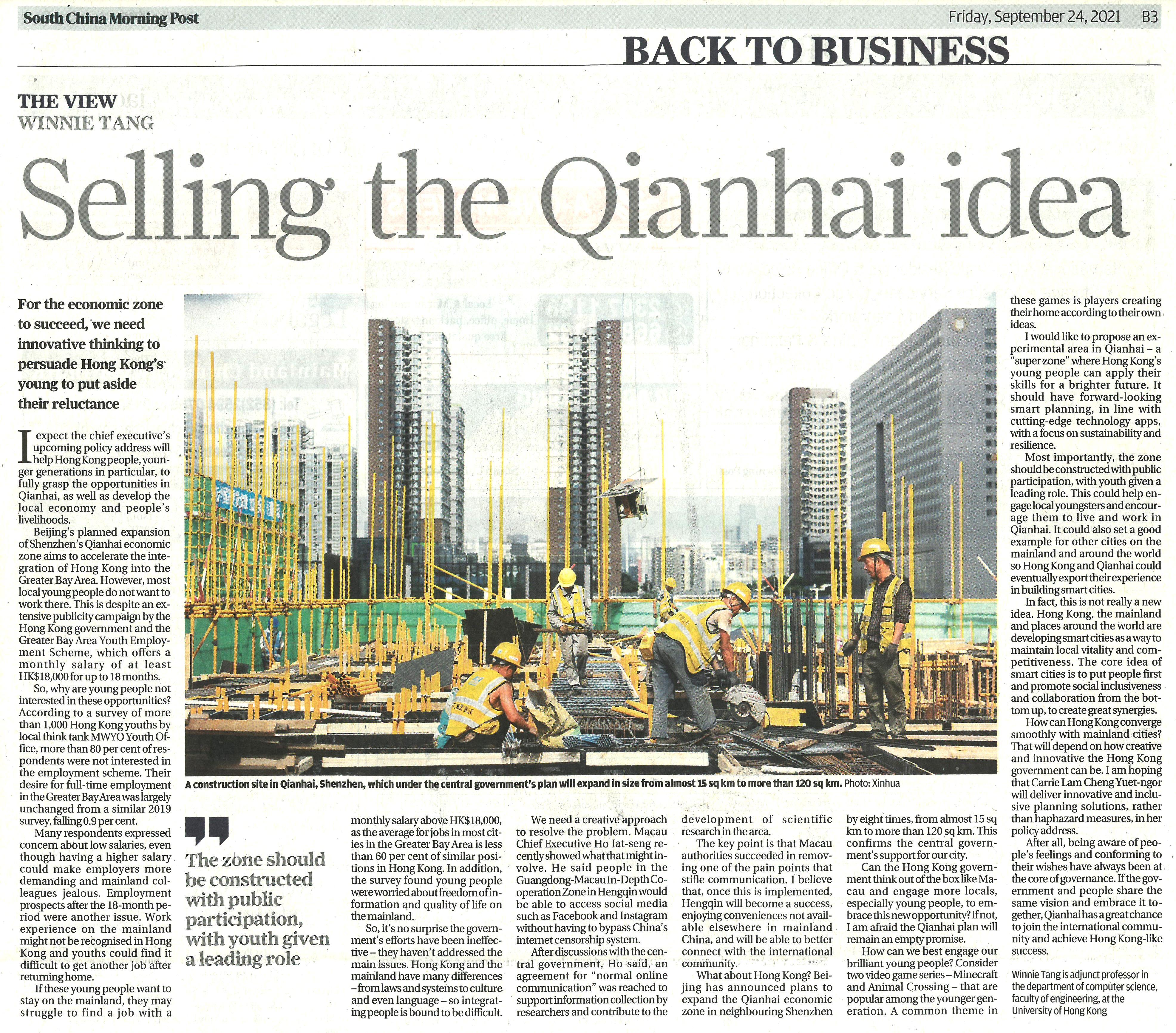網上版請按此

Selling the Qianhai idea
For the economic zone to succeed, we need innovative thinking to persuade Hong Kong's young to put aside their reluctance
I expect the chief executive's upcoming policy address will help Hong Kong people, younger generations in particular, to fully grasp the opportunities in Qianhai, as well as develop the local economy and people's livelihoods.
Beijing's planned expansion of Shenzhen's Qianhai economic zone aims to accelerate the integration of Hong Kong into the Greater Bay Area. However, most local young people do not want to work there. This is despite an extensive publicity campaign by the Hong Kong government and the Greater Bay Area Youth Employment Scheme, which offers a monthly salary of at least HK$18,000 for up to 18 months.
So, why are young people not interested in these opportunities? According to a survey of more than 1,000 Hong Kong youths by local think tank MWYO Youth Office, more than 80 per cent of respondents were not interested in the employment scheme. Their desire for full-time employment in the Greater Bay Area was largely unchanged from a similar 2019 survey, falling 0.9 per cent.
Many respondents expressed concern about low salaries, even though having a higher salary could make employers more demanding and mainland colleagues jealous. Employment prospects after the 18-month period were another issue. Work experience on the mainland might not be recognised in Hong Kong and youths could find it difficult to get another job after returning home.
If these young people want to stay on the mainland, they may struggle to find a job with a monthly salary above HK$18,000, as the average for jobs in most cities in the Greater Bay Area is less than 60 per cent of similar positions in Hong Kong. In addition, the survey found young people were worried about freedom of information and quality of life on the mainland.
So, it's no surprise the government's efforts have been ineffective - they haven't addressed the main issues. Hong Kong and the mainland have many differences - from laws and systems to culture and even language - so integrating people is bound to be difficult.
We need a creative approach to resolve the problem. Macau Chief Executive Ho Iat-seng recently showed what that might involve. He said people in the Guangdong-Macau In-Depth Cooperation Zone in Hengqin would be able to access social media such as Facebook and Instagram without having to bypass China's internet censorship system.
After discussions with the central government, Ho said, an agreement for "normal online communication" was reached to support information collection by researchers and contribute to the development of scientific research in the area.
The key point is that Macau authorities succeeded in removing one of the pain points that stifle communication. I believe that, once this is implemented, Hengqin will become a success, enjoying conveniences not available elsewhere in mainland China, and will be able to better connect with the international community.
What about Hong Kong? Beijing has announced plans to expand the Qianhai economic zone in neighbouring Shenzhen by eight times, from almost 15 sq km to more than 120 sq km. This confirms the central government's support for our city.
Can the Hong Kong government think out of the box like Macau and engage more locals, especially young people, to embrace this new opportunity? If not, I am afraid the Qianhai plan will remain an empty promise.
How can we best engage our brilliant young people? Consider two video game series - Minecraft and Animal Crossing - that are popular among the younger generation. A common theme in these games is players creating their home according to their own ideas.
I would like to propose an experimental area in Qianhai - a "super zone" where Hong Kong's young people can apply their skills for a brighter future. It should have forward-looking smart planning, in line with cutting-edge technology apps, with a focus on sustainability and resilience.
Most importantly, the zone should be constructed with public participation, with youth given a leading role. This could help engage local youngsters and encourage them to live and work in Qianhai. It could also set a good example for other cities on the mainland and around the world so Hong Kong and Qianhai could eventually export their experience in building smart cities.
In fact, this is not really a new idea. Hong Kong, the mainland and places around the world are developing smart cities as a way to maintain local vitality and competitiveness. The core idea of smart cities is to put people first and promote social inclusiveness and collaboration from the bottom up, to create great synergies.
How can Hong Kong converge smoothly with mainland cities? That will depend on how creative and innovative the Hong Kong government can be. I am hoping that Carrie Lam Cheng Yuet-ngor will deliver innovative and inclusive planning solutions, rather than haphazard measures, in her policy address.
After all, being aware of people's feelings and conforming to their wishes have always been at the core of governance. If the government and people share the same vision and embrace it together, Qianhai has a great chance to join the international community and achieve Hong Kong-like success.
Dr. Winnie Tang
Adjunct Professor, Department of Computer Science, Faculty of Engineering; Department of Geography, Faculty of Social Sciences; and Faculty of Architecture, The University of Hong Kong